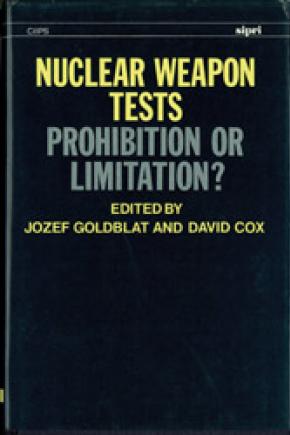Nuclear Weapon Tests: Prohibition or Limitation?
Nuclear explosions are the most visible manifestation of the arms race, and the conclusion of a multilateral treaty that will meaningfully restrict nuclear testing has for three decades been a priority. While some see testing as essential for the development of nuclear weapons and for upholding nuclear deterrence postures, others are acutely concerned about the possible health hazards of nuclear tests. Proponents of a comprehensive test ban, or a very-low-threshold test ban, are convinced that further test limitations are the first, indispensable steps that must be taken to halt and reverse the nuclear rivalry among the great powers and to prevent the spread of nuclear wapons to more countries.
The Stockholm International Peace Researach Institute (SIPRI) and the Canadian Institute for International Peace and Security (CIIPS) have jointly conducted a thorough study of the complex technical and political issues involved in a possible cessation or limitation of nuclear tests. This SIPRI-CIIPS publication contains papers by leading physicists, nuclear weapon designers, seismologists, international lawyers, strategic analysts, political scientists, and former government advisers and arms control negotiators. The editors' concise summary of all the issues and viewpoints is presented in the first part of the book, which also contains their own conclusions about the feasibility of achieving a meaningful test limitation that is adequately verifiable by existing or proposed technical means.
Part I. Summary and conclusions
Jozef Goldblat and David Cox
Part II. Overview of nuclear explosions
1. The purpose of nuclear test explosions
Paper 1
J. Carson Mark
Paper 2
Donald M. Kerr
Part II. Overview of nuclear explosions
2. The role of laboratory tests
Paper 3
Donald R. Westervelt
3. Nuclear explosions for peaceful purposes
Paper 4
Iris Y. P. Borg
4. Environmental effects of underground nuclear explosions
Paper 5
A. C. McEwan
Part III. The historical record
5. Survey of past nuclear test ban negotiations
Paper 6
G. Allen Greb
6. The nuclear explosion limitation treaties
Paper 7
Jozef Goldblat
Part IV. The question of verification
7. Present capabilities for the detection and identification of seismic events
Paper 8
Lynn R. Sykes
Appendix 8A. Letter to Hugh E. DeWitt, Lawrence Livermore National Library
Appendix 8B. Weapons of various sizes that had been tested by Spring 1985
Paper 9
Dennis C. Fakley
8. International seismological verification
Paper 10
Peter W. Basham and Ola Dahlman
9. In-country seismic stations for monitoring nuclear test bans
Paper 11
Willard J. Hannon, Jr
10. Techniques to evade detection of nuclear tests
Paper 12
Jeremy K. Leggett
11. Means of nuclear test ban verification other than seismological
Paper 13
Allan M. Din
12. On-site inspection to check compliance
Paper 14
Warren Heckrotte
Paper 15
A. A. Vasiliev and I. F. Bocharov
13. Degree of verification needed
Paper 16
Ray E. Kidder
14. Verification of very-low-yield nuclear test ban
Paper 17
Charles B. Archambeau
Part V. Consequences of the cessation or further limitation of nuclear tests
15. Attitudes of the nuclear weapon powers
Paper 18
Carl G. Jacobsen
16. Attitudes of the nuclear threshold countries
Paper 19
Peter Lomas
17. A nuclear test ban and prevention of nuclear weapon proliferation
Paper 20
Paul C. Warnke
Paper 21
Vitalii I. Goldanskii
18. Political, strategic and psychological effects of a nuclear test ban
Paper 22
Eugene J. Carroll, Jr
Annexes
Annexe 1. Existing legal limitations on nuclear explosions
Prepared by Ragnhild Ferm
Annexe 2. Major proposals for a complete test ban treaty
Annexe 3. Seismological means of nuclear test ban verification: Techniques and equipment
Eva Johannisson
Annexe 4. Nuclear explosions, 16 July 1945-1 July 1987
Robert S. Norris and Ragnhild Ferm

